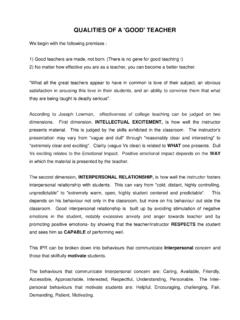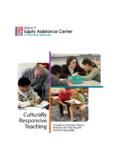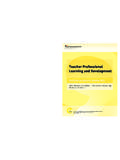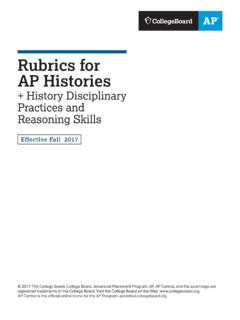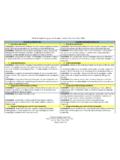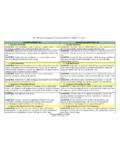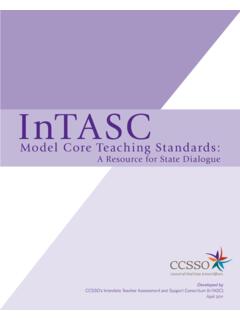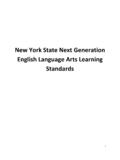Transcription of Teacher Values and Relationship: Factors in Values …
1 Australian Journal of Teacher education Volume 36 | Issue 2 Article 5. 2011. Teacher Values and relationship : Factors in Values education Laurie Brady University of Technology, Sydney Recommended Citation Brady, Laurie (2011) " Teacher Values and relationship : Factors in Values education ," Australian Journal of Teacher education : Vol. 36: Iss. 2, Article 5. Available at: This Journal Article is posted at Research Online. Australian Journal of Teacher education Teacher Values and relationship : Factors in Values education Laurie Brady University of Technology, Sydney Abstract: Intrigued by the notion that effective teaching is as much about relationship as it is about technical' proficiency, the author examines the Values of teachers that inform classroom relationships, and poses the question as to whether there are particular Teacher Values that are necessary for quality Values education .
2 This question is addressed by focusing on the teaching strategies involved in the major approaches to Values education , and by deducing the Teacher Values necessary for effective teaching. The implications for the pedagogy of Teacher education are briefly discussed. Introduction The National Framework for Values education in Australian Schools (Department of education , Science and Training, 2005) refuelled the continuing debate on how best to teach Values in schools. By 2005 this resurgence of interest was already in evidence throughout the Australian states (the Queensland Department of education 's Strategic Plan for 2004-2008; South Australia's Curriculum, Standards and Accountability Framework; Western Australia's Curriculum Framework.)
3 Victoria's Essential Learning Standards; and New South Wales's Values in NSW. Public Schools (2004). However one consistently overlooked factor in the Values education debate is the impact of the Teacher 's own personal Values , and the way these Values are expressed in classroom teaching. In 1971, Postman and Weingartner, in Teaching as a Subversive Activity, argued facetiously that all prospective teachers should have to undergo psychotherapy in their Teacher education , and more subversively,' that they should have to prove that they have experienced at least one loving relationship with another human being.
4 While the reader appreciates the humour of these mocking claims, they do raise the question as to whether Teacher education should focus almost exclusively on the technical skills of teaching at the expense of teaching about relationship . Such a task is certainly problematic as it implies provision for a Teacher 's personal as well as professional development, and involves a consideration of the Values that inform the Teacher 's practice. Addressing the problem of determining the impact of Teacher Values on teaching in general and Values education in particular involves seeking answers to two related questions: Is effective teaching the expression of a general set of Teacher personal Values that inform Teacher behaviours and relationships with students?
5 Are there specific Teacher Values that inform quality Values education ? Before focusing on these questions it is necessary to establish that teaching is Values -laden. In one sense teachers are inevitably social and moral educators. Whatever institutional restraints exist within a school, teachers are faced with taking Vol 36, 2, March 2011 56. Australian Journal of Teacher education positions on a variety of social and emotional issues, and are therefore developing Values that are informed by these challenges.
6 More generally, a Teacher 's selection of subject content, and his/her choice of strategies and structures to impart that content are Values -laden. For instance, deciding between a transmission model of teaching involving Teacher presentation, and a collaborative approach involving students more proactively, both reflects Teacher Values and sends significant messages about the Teacher 's Values to students. The research of Halstead and Xiao (2010) on the impact of the hidden curriculum on Values education , underlines the students' constant learning of Values that may not be those that are explicitly taught.
7 The authors give the example of students learning when it is appropriate to disobey certain rules, and how tolerance may be learned after reflection on a Teacher 's dominating behaviour. Just as teachers bring and develop a variety of professional and personal Values to classroom relationships, the students also bring a variety of Values from the home. These will include varying expressions of tolerance, respect for others, social conscience and personal responsibility. So relationship is a dynamic process that is informed by the Values of both students and Teacher (see Adelbjarnardottir 2010.)
8 Brophy and Good 1974). Desirable Teacher Values That Inform Teaching The dangers in deriving an ideal set of Teacher Values for effective teaching include the tendency to confuse personality with character' ( Values ), and personal Values with professional Values . One attractive image is that of the Teacher who is approachable, charming, enthusiastic and possessing a strong sense of humour. It may well be however that some students prefer a Teacher who exhibits the opposite, that is, one who is distant, phlegmatic and humourless, as this Teacher may produce better results.
9 Carr (2010, 64-5) argues that while certain desirable qualities (like enthusiasm and charm) may contribute to professional expertise, such personality traits are only contingently contributory.' While the expression of professional behaviours is dependent on certain personal Values , it is the context-sensitive expression of these Values that has relevance for classrooms. There is no lack of literature that examines desirable Teacher behaviour, and therefore implicitly, Teacher Values . There is also a growing awareness of the importance of relationship to effective teaching and learning.
10 For instance, impelled by the belief that attention to pedagogical relationships is long overdue,' Bingham and Sidorkan (2004, 40) edit a variety of contributions that explore the significance of relation' in education , focusing not so much on educational process as on human relationships. Tirri's (2010) recent research on Teacher Values that inform professional ethics and relationship identifies caring and respect, professionalism and commitment, and cooperation. For Tirri (2010, 156), caring and respect are the most evident emotional expressions' apparent in meeting the needs of individual students.










